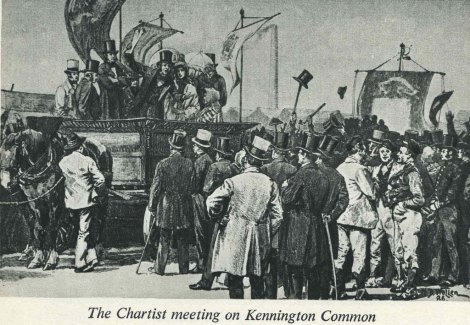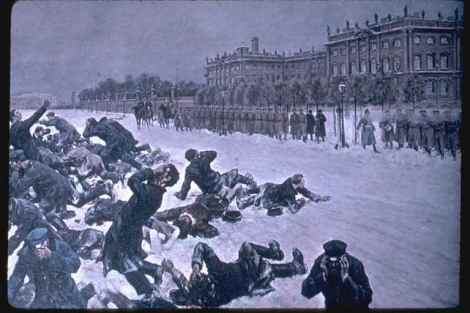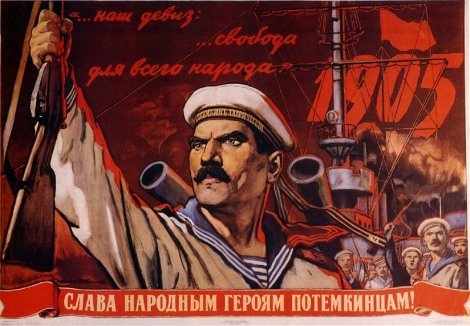In his 1904 preface to the Italian edition of Words of a Rebel, Kropotkin discusses the renewed militancy among European workers, and the embrace of the general strike as a means of revolutionary transformation. Soon thereafter, general strikes broke out, first in Poland, and then in Russian itself, as Polish and Russian workers rose against Czarist autocracy, leading to the 1905 Russian Revolution. Although the Revolution was ultimately unsuccessful, it proved but a prelude to the 1917 Russian Revolution, which led to the final overthrow of the Czarist regime. In this essay, “The Revolution in Russia,” first published in the Nineteenth Century magazine, Vol. 58, No. 346 in December 1905, Kropotkin discusses the origins and development of the 1905 Russian Revolution from an anarchist perspective, emphasizing again the role of the general strike, as did Siegfried Nacht in his contemporaneous pamphlet, The Social General Strike, which was widely translated and distributed at the time. Due to the length of Kropotkin’s essay, which I do not believe has yet been posted on the internet, I will be presenting it in installments, starting, naturally enough, with Part One.
Kropotkin: The Revolution in Russia, Part One
Events in Russia are following one another with that rapidity which is characteristic of revolutionary periods. Eleven months ago when I wrote in this review about the constitutional agitation in Russia, the Congress of the Zemstvos, which had timidly expressed the desire of having some sort of representative institutions introduced in Russia, was the first open step that had been made by a collective body in the struggle which was going to develop itself with such an astounding violence. Now, autocracy, which then seemed so solid as to be capable of weathering many a storm, has already been forced to recognize that it must cease to exist. But between these two events so many others of the deepest importance have taken place that they must be recalled to memory, before any safe conclusion can be drawn as to the probable further developments of the revolution in Russia.
On August 10, 1904, the omnipotent minister of the interior, Plehve, was killed by the revolutionary socialist Sazonov. Plehve had undertaken to maintain autocracy for another ten years, provided that he and his police were invested with unlimited powers; and having received these powers, he had used them so as to make of the police the most demoralized and dangerous body in the state. In order to crush all opposition, he had not recoiled from deporting at least thirty thousand persons to remote corners of the empire by mere administrative orders. He was spending immense sums of money for his own protection, and when he drove in the streets, surrounded by crowds of policemen and detective bicyclists and automobilists, he was the best-guarded man in Russia—better guarded than even the tsar. But all that proved to be of no avail. The system of police rule was defeated, and nobody in the tsar’s surroundings would attempt to continue it. For six weeks the post of minister of the interior remained vacant, and then Nicholas II reluctantly agreed to accept Sviatopolk-Mirskii, with the understanding that he would allow the zemstvos to work out some transitional form between autocracy pure and simple, and autocracy mitigated by some sort of national representation. This was done by the zemstvos at their congress in November of last year, when they dared to demand “the guarantee of the individual and the inviolability of the private dwelling,” “the local autonomy of self-administration,” and “a close intercourse between the government and the nation,” by means of a specially elected body of representatives of the nation who would “participate in the legislative power, the establishment of the budget, and the control of the administration.”
Modest though this declaration was, it became the signal for a general agitation. True, the press was forbidden to discuss it, but all the papers, as well as the municipal councils, the scientific societies, and all sorts of private groups discussed it nevertheless. Then, in December last, the “intellectuals” organized themselves into vast unions of engineers, lawyers, chemists, teachers, and so on—all federated in a general union of unions. And amid this agitation, the timid resolutions of the zemstvos were soon outdistanced. A constituent assembly, elected by universal, direct, and secret suffrage, became the watchword of all the constitutional meetings. This demand was soon as popular as the paragraphs of the charter were during the Chartist agitation [in England 1836-1848].
The students were the first to carry these resolutions into the streets, and they organized imposing demonstrations in support of these demands at St. Petersburg, Moscow, and in all the university towns. At Moscow the Grand Duke Sergei [Aleksandrovich Romanov] ordered the troops to fire at the absolutely peaceful demonstration. Many were killed and from that day he became a doomed man.
Things would have probably dragged if the St. Petersburg workingmen had not at this moment lent their powerful support to the young movement—entirely changing by their move the very face of events. To prevent by any means the “intellectuals” from carrying on their propaganda amid the workingmen and the peasant had been the constant preoccupation of the Russian government; while, on the other side, to join hands with the workers and the peasants and to spread among them the ideas of freedom and socialism had always been the goal of the revolutionary youth for the last forty years—since 1861. Life itself worked on their side. The labour movement played so prominent a part in the life of Europe during the last half-century, and it so much occupied the attention of all the European press, that the infiltration of its ideas into Russia could not be prevented by repression. The great strikes of 1896—1900 at St. Petersburg and in central Russia, the growth of the labour organizations in Poland, and the admirable success of the Jewish labour organization, the Bund, in western and south western Russia proved, indeed, that the Russian workingmen had joined hands in their aspirations with their Western brothers.
There is no need to repeat here what Father Gapon has told already in his autobiography—how he succeeded in grouping in a few months a considerable mass of the St. Petersburg workers around all sorts of lecturing institutes, tea restaurants, cooperative societies, and the like, and how he, with a few workingmen friends, organized within that mass and linked together several thousands of men inspired by higher purposes. They succeeded so well in their underground work that when they suggested to the workingmen that they should go en masse to the tsar, and unroll before him a petition asking for constitutional guarantees as well as for some economic changes, nearly seventy thousand men took in two days the oath to join the demonstration, although it had become nearly certain that the demonstration would be repulsed by force of arms. They more than kept word, as they came out in still greater numbers—about two hundred thousand—and persisted in approaching the Winter Palace notwithstanding the firing of the troops.
It is now known how the emperor, himself concealed at Tsarskoe Selo, gave orders to receive the demonstrators with volley-firing; how the capital was divided for that purpose into military districts, each one having at a given spot its staff, its field telephones, its ambulances… The troops fired at the dense crowds at a range of a few dozen yards, and no less than two to three thousand men, women, and children fell: the victims of the tsar’s fears and obstinacy.
The feeling of horror with which eyewitnesses, Russian and English, speak of this massacre surpasses description. Even time will not erase these horrible scenes from the memories of those who saw them, just as the horrors of a shipwreck remain engraved forever in the memory of a rescued passenger. What Gapon said immediately after the massacre about the viper’s brood of the whole dynasty was echoed all over Russia, and went as far as the valleys of Manchuria. The whole character of the movement was changed at once by this massacre. All illusions were dissipated. As the autocrat and his supporters had not shrunk from that wanton, fiendish, and cowardly slaughtering, it was evident that they would stop at no violence and no treachery. Since that day the name of the Romanov dynasty began to become odious among the workingmen of Russia. The illusion of a benevolent autocrat who was going to listen paternally to the demands of his subjects was gone forever.
Distrust of everything that might come from the Romanovs took its place; and the idea of a democratic republic, which formerly was adopted by a few socialists only, now found its way even into the relatively moderate program. To let the people think that they might be received by the tsar, to lure them to the Winter Palace, and there to mow them down by volleys of rifle fire—such crimes are never pardoned in history.
If the intention of Nicholas II and his advisers had been to terrorize the working classes, the effect of the January slaughter was entirely in the opposite direction. It gave a new force to the labour movement all over Russia. Five days after the terrible “Vladimir” Sunday, a mass strike broke out at Warsaw, and was followed by mass strikes at Lodz and in all the industrial and mining centers of Poland. In a day or two the Warsaw strike was joined by a hundred thousand operatives and became general. All factories were closed, no tramways were running, no papers were published. The students joined the movement, and were followed by the pupils of the secondary schools. The shop assistants, the clerks in the banks and in all public and private commercial establishments, the waiters in the restaurants—all gradually came out to support the strikers. Lodz joined Warsaw, and two days later the strike spread over the mining district of Dombrowo. An eight-hour day, increased wages, political liberties, and home rule, with a Polish Diet sitting at Warsaw were the demands of all the strikers. We thus find in these Polish strikes all the characteristics which, later on, made of the general strikes of October last so powerful a weapon against the crumbling autocratic system.
If the rulers of Russia had had the slightest comprehension of what was going on, they would have perceived at once that a new factor of such potency had made its appearance in the movement, in the shape of a strike in which all classes of the population joined hands, that nothing remained but to yield to their demands; otherwise the whole fabric of the state would be shattered down to its deepest foundations. But they remained as deaf to the teachings of modern European life as they had been to the lessons of history; and when the strikers appeared in the streets, organizing imposing demonstrations, they knew of no better expedient than to send the order: “Shoot them! ” In a couple of days more than three hundred men and women were shot at Warsaw, one hundred at Lodz, forty-three at Sosnowice, forty-two at Ostrowiec, and soon, all over Poland!
The result of these new massacres was that all classes of society drew closer together in order to face the common enemy, and swore to fight till victory should be gained. Since that time governors of provinces, officers of the police, gendarmes, spies, and the like have been killed in all parts of Poland, not one day passing without some such act being recorded; so it was estimated in August last that ninety-five terrorist acts of this sort had taken place in Poland, and that in very few of them were the assailants arrested As a rule they disappeared—the whole population evidently helping to conceal them.
Peter Kropotkin, November 1905




Leave a comment